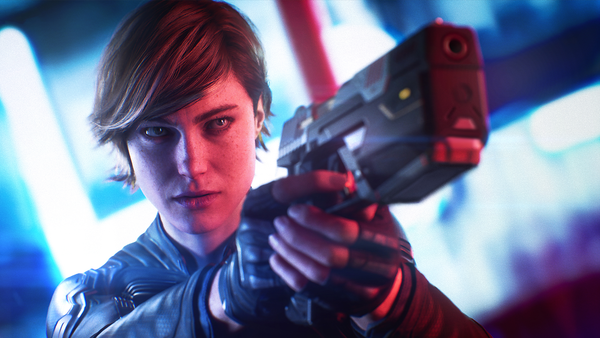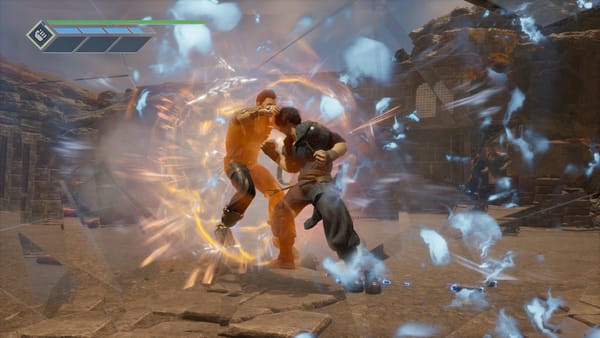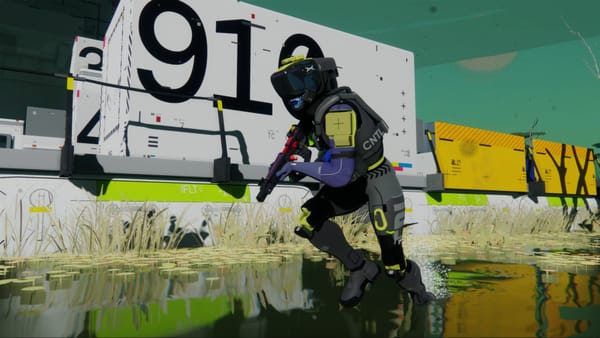#238: Network down
Yet another twist of the knife in the games media's annus horribilis.
Hello, everyone. I would like to briefly reassure the 160-odd of you who have signed up in the couple of weeks since Machine Killer that Hit Points does not just go on about the games media all the time. Honestly I try to avoid it as often as possible. Just the way of things at the moment, forgive me.
Well, here we go again. On Monday, overlords at ReedPop told staff they were seeking a buyer for Gamer Network, the umbrella collective of UK websites Eurogamer, Gamesindustry.biz, Rock Paper Shotgun, VG247 and Dicebreaker, and their related YouTube channels and partnerships. The announcement is the latest twist of the knife in a brutal year for the games media, which has been hit with successive waves of layoffs and closures as the ad market contracts and the sector’s Monty Burns types see the rise of generative machine learning as an easy route to their next ivory backscratcher. Hit Points has a number of acquaintances, former colleagues and top-tier chums at Gamer Network, and my thoughts are with them and everyone around them as they enter the holiday season beneath a cloud of uncertainty. They, like all those that have gone before them in games journalism’s annus horribilis, deserve much, much better than this.
It is fairly obvious that Reedpop’s purchase of Gamer Network hasn’t gone remotely to plan, though that has nothing to do with the performance of the websites themselves, which as I understand it are in relatively good shape. The jewel in Gamer Network’s crown, at least from the perspective of an events company like ReedPop, is the EGX gaming convention, the biggest of its kind in the UK. No doubt ReedPop pictured adding EGX to its stable of pop-culture events (it also runs Comic-Con and PAX) and figured global domination was guaranteed.
The fates had other plans, of course. Two years after the buyout a global pandemic took hold and the arse fell out of the events industry overnight, which completely transformed the calculus of the acquisition. The part of the business ReedPop actually understood stopped making money overnight, and the media side started posting record numbers amid a lockdown-era surge in interest in fun ways to pass the time indoors.
Nearly four years later, the script has flipped, with the events circuit revived and online media circling the toilet bowl, and evidently ReedPop has decided that enough is now enough. Perhaps, if we are to be especially kind, we should be relieved that a) ReedPop has taken this long to do something about it, and b) it is doing so with a sale, rather than a closure (or at least trying to; if no buyer can be found closures are the most likely result, as the staff at Jezebel found out earlier this month). So, yeah. I can certainly see the thinking here, though that should absolutely not be read as an expression of sympathy for ReedPop’s resident aftershave-wearers.
So, a sale it is — or at least, a sale is the best we can hope for. A group of websites, however successful and respected its component parts may be, is going to be a horribly tough sell in the current climate. I cannot think of a single potential buyer who would bring much in the way of stability, let alone positive change. G/O Media? Gamurs Group? The Saudi Public Investment Fund? We are well past the bottom of the barrel here, I think. And ReedPop will surely find it even harder to find a new steward for the Eurogamer family given that the events business is not being included in the sale. The (presumably) most profitable bit of the company — the part with the most obvious growth and expansion potential, the bit that attracted ReedPop to buying Gamer Network in the first place — is going nowhere.
No doubt this was always the plan. ReedPop surely never had the slightest interest in becoming a media baron, though it was of course happy to wheel all that website cash to the bank during the pandemic boom times. What’s happened this week is a tale as old as time, the sort of thing the people who make these decisions, and write these cheques, would tell you is just good business, old fruit. Buy the entire company, trundle along for a while to keep up appearances, then discard the less profitable, or loss-making, or simply a-bit-too-difficult stuff a few years later while keeping the prize asset, or assets for yourself. If you’re lucky you’ll get to do it under the cover of a global economic downturn, offload the blame on a superpower’s central bank or some faraway warmonger. If not you can do a Unity and portray it as a vital part of some epoch-definining restructure, or just go full Tim Sweeney and sacrifice 830 thankless souls at the altar of your own bad decisions. It’s a proven formula, this stuff. Once you get to the top, you really can’t lose.
This is hardly a new phenomenon, I realise, in capitalism or even the game industry. But it’s a chastening reminder that acquisitions are never really about the people, or the work they do; just the money that can be made today, the slightly-more-money they may be able to make tomorrow, and the hypothetical money that may be made in future after they have been shitcanned, or sold off, or otherwise restructured out of the picture. Which is why a team of talented writers, editors and back-office staff, behind some of the most respected games websites in the world, went to work on Monday after another annual punishing shift at the Black Friday coalface to find, as Eurogamer’s Tom Phillips put it the other day, that their employer had been working on a seasonal offer of their own. This time, however, there will be no affiliate scheme to share the wealth.





